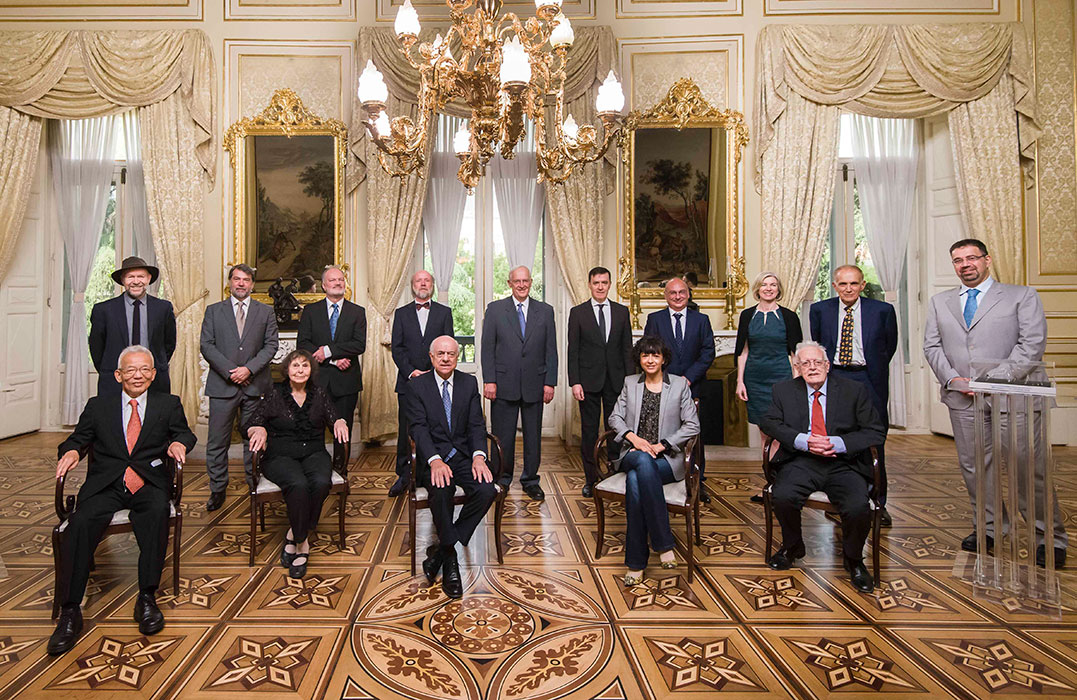The BBVA Foundation Frontiers of Knowledge Awards champion science’s role as a keystone of culture
Architects of some of the successes that best reflect the progress of knowledge in these past decades, the winners in the 9th edition of the BBVA Foundation Frontiers of Knowledge Awards collected their awards in Madrid’s Marqués de Salamanca Palace. “From predicting the onset of climate change to designing the most sophisticated artificial intelligence or the most precise techniques for genome editing, by way of modeling the impact of human aggressions on our planet, the Frontiers Awards reflect the bounty of science in all its diversity,” in the words of BBVA Foundation President Francisco González.
15 June, 2017
For González, the award ceremony was an occasion to champion “the rational thinking that underpins science, and which science, in turn, expands and refines through its role as a motor of culture and a foundation for decision-making.”
The President of the BBVA Foundation recalled that these awards were created almost ten years ago to recognize and give visibility to those who generate knowledge, a mission that is now more vital than ever: “It is essential that public policy-makers, private agents and society and its culture are guided in their relations with reality by trial and error reasoning, the interaction of theory and empirical evidence, the critical examination of ideas, and the subjection of outcomes to rational debate.”
“This is not about turning citizens into scientists,” he added, “but about something far more basic: the understanding that there is a line that demarcates subjective opinion from knowledge that has been tested and validated by the scientific community.” Because, in González’s view, “one of the most pernicious forms of inequality is that in which large sectors of society are excluded from knowledge. And when this ignorance or skepticism about validated knowledge extends to policy-makers with considerable influence in the modeling of the social agenda, the situation becomes especially disquieting. So much so, that we must redouble our efforts to have science viewed as culture.”]
The President of the BBVA Foundation pointed to the example of the Frontiers laureates. “We need these models if we wish to reduce the grave cognitive inequality that divides today’s society, the breach between those who live immersed in the knowledge society and those who confine themselves to using its products, never thinking to inquire if what lies behind the screen or the click is magic or science.”
Both the laureates and González himself defend the importance of basic knowledge; the kind that does not seek immediate application but rather “determines our vision of the world we live in, our system of coordinates for interpreting reality and, therefore, the way we view and relate to others,” remarked the BBVA Foundation President.
The ceremony was attended by Spain’s Secretary of State for Research, Development and Innovation, Carmen Vela; the President of the Spanish National Research Council (CSIC), Emilio Lora-Tamayo, and numerous representatives of the Spanish and international scientific and artistic communities.
The awardees in this edition are mathematicians David Cox and Bradley Efron, for developing statistical tools that are fundamental to the advance of modern science; biologists Emmanuelle Charpentier, Jennifer Doudna and Francisco Martínez Mojica, for developing CRISPR, the most efficient and precise gene-editing technique; ecologists Gene E. Likens and Marten Scheffer, for alerting the world to the global impact of acid rain and discovering that human action can subject ecosystems to drastic and at times irreversible change; computer scientist Geoffrey Hinton, for advancing the field of artificial intelligence by creating programs able to learn for themselves; economist Daron Acemoglu, for identifying the quality of institutions as a key determinant of countries’ welfare and growth; composer Sofia Gubaidulina, for the spiritual quality and transformative dimension of her music; climatologists Syukuro Manabe and James Hansen, for creating the first computer models of climate, which predicted global warming induced by CO2 emissions; and biomedical researchers Pedro Alonso and Peter Myler, for achieving vital advances against diseases like malaria that afflict hundreds of millions in developing countries.


